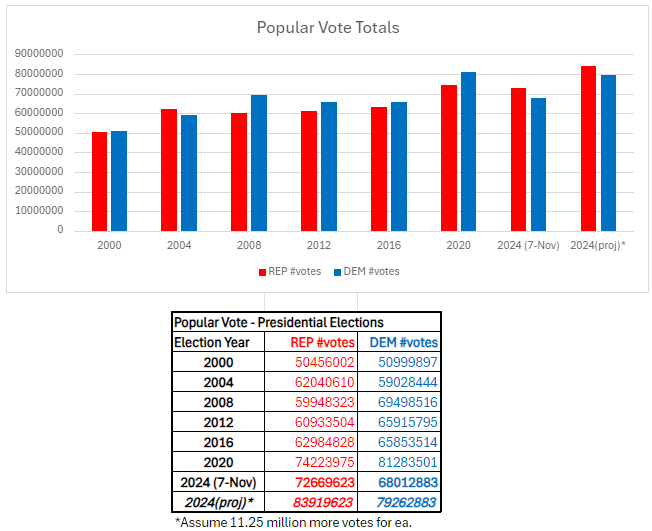On WNRI 1380 AM/95.1 FM, John DePetro and Justin Katz discuss:
- Somebody’s Raimondo trial balloon
- Room for centrists in the RI Democrat Party?
- Magaziner pretends to have credibility to complain about Republican nominees
- Calling McKee’s illegal immigrant bluff
- Washington Bridge deteriorates
- Providence Place empties
Featured image by Justin Katz using Dall-E 40 and Photoshop AI.
[Open full post]On WNRI 1380 AM/95.1 FM, John DePetro and Justin Katz discuss:
- National election results
- Illegal immigration pledges in Providence and the State House
- Ruggerio as the face of RI government
- RI’s status in a Republican nation
Featured image by Justin Katz using Dall-E 40 and Photoshop AI.
[Open full post]There is a Presidential popular vote chart getting a lot of attention out there that seems to show a big drop in Democratic votes from 2020 to 2024.
However, as pointed out by Dan McLaughlin, I think people are getting over their skis before all of the data is in. I thought a picture showing the projected ballpark final results would help.
Below was created using Wikipedia popular vote totals for 2000-2020. For 2024 vote data, I took current totals from Bing search (84% reporting) this morning & projected the balance, giving each candidate 11.25 mil more votes (I assumed equal distribution, it could be a million or 2 either way, but what’s that between friends?).
Make of it what you will, I’m not a political scientist and I know it’s brute force projection and not perfect. But Harris isn’t going to end up all that far behind Biden. And Trump really improved. Harris will receive around 2 million fewer votes than Biden in ’20. Trump will receive over 2 million more than Biden in ’20 and will increase his total by nearly 10 million. Harris didn’t turn out as many voters as Biden, Trump had a great turnout op – finding unlikely voters and bringing them in and flipping some former Biden voters.
Featured image by Justin Katz using Adobe Firefly.
[Open full post]While developing plans for the future, I’ve been reading about the history of American journalism, and an observation from the post-Revolution period has been worth more than a few underlines. Political parties always want dedicated media outlets, but media outlets dedicated to partisan politics never pay for themselves. Jefferson had to give a no-show State Department job to the guy who started a partisan paper for his faction.
In the late 1900s, we had a period when the news media could sell its wide variety of news and entertainment products to readers and then sell its readership to advertisers. This platform provided the revenue for their partisan activities on the opinion pages. The Internet blew that model up by providing a better platform for the profitable components, including partisan promotion, which can be subsidized in other ways and/or crowdsourced to partisans.
I’ve long thought newspapers’ problem was that advertisers could now track the ineffectiveness of their ads, but there’s another factor, too. Over the past couple decades, news organizations have seemed to conclude the solution is to focus on their audience segments and cater their reportage and entertainment to politics. In other words, they’ve made the entire paper (or broadcast) partisan.
This exposes the reality that the journalism industry’s raison d’être (including college departments) is not journalism, but partisan activism, in which case they have to find other ways of subsidizing themselves (like National Review cruises); Americans have shown for 250 years that we aren’t willing to pay to engage with their political communities if they can do so by other means.
If media outlets want to be genuine journalistic enterprises, however, the attempts to appeal to narrower audiences with political flavoring suggests they’re focusing on the wrong dimension of their business. They have to figure out what they’re selling and then take politics out of it entirely.
Candidly, I’m not sure the market exists. Americans once needed newspapers to tell them what ships were arriving and what was onboard; all such practical information can now be better provided directly or through narrowly dedicated channels. Meanwhile, no matter what they say, people aren’t interested in raw information or even objective analysis. That’s the fare of trade publications. Mass audiences are interested in the stories of people against people, which in the current environment easily collapses into partisan media, which must be subsidized, often by the special interests who benefit.
If publications and journalists want to remain true to their ideal and provide news for its own sake, they’ll have to become something like the sports pages, but for current events. They’ll have to find a way to tell the story of the battle of the teams without giving the impression that they favor any of them… not with dispassionate objectivity, but with passion for the story.
The news industry, having been taken over by progressives, is neither attracting nor forming the people to undertake such a task. The story for them, then, is that they must either find a way or become another chapter in a history book.
Featured image by Justin Katz using Dall-E 40 and Photoshop AI.
[Open full post]Mark Steyn’s daily pre-election column is vintage Steyn today.
But in Botswana everyone voted on Wednesday, the last up-country results came in on Thursday, the ruling party conceded and the new guy was sworn in on Friday.
That’s a normal election in a normal country.
Meanwhile, back in the greatest country in the history of countries, in twenty-four hours we shall be embarking on the usual folderol offour-hour lines to vote, malfunctioning machines, burst water pipes, court injunctions to keep polls open or close them down (according to taste), pausing the count before it’s completed, and the GDP-boosting quadrennial spike in plywood sales as storekeepers in DC and elsewhere board up their windows.
And that’s if it’s a “normal” election by American standards.
Read the whole thing, wherein Steyn weaves together multiple stories drawn from our rapid-fire headlines. The picture he paints is of the mess we’ve allowed our country to become since we elected a community organizer to the Presidency, and no matter who wins on Tuesday (or whenever), we have to take our country back. As he states in the key point of the essay: “it’s hard to calibrate the precise point at which the soft totalitarianism turns, instantly, into hard, psychotic, murderous totalitarianism … you never know it’s time to break for the border until it’s too late.”
[Open full post]On WNRI 1380 AM/95.1 FM, John DePetro and Justin Katz discuss:
- McKee fumbles ILO victory
- The governor and the lobbyist
- Foulkes on the path
- RI politics… from Hasbro’s point of view
- Ruggerio in decline
Featured image by Justin Katz using Dall-E 40.
[Open full post]I’ve fallen way behind, so this tweet from Ken Block is a couple months old, but its content is (unfortunately) timeless in Rhode Island:
The picture being painted for me by over ten current and former DOT employees is a toxically managed organization where who you know is far more important than how you do your job and where technical expertise has been systematically eliminated in favor of managers with no industry experience.
Our state government is a scam taking tax dollars for favored members of the Party. Unfortunately, journalists have been indoctrinated in the Democrats-as-heroes storyline for generations, so they are fundamentally incapable of reporting on the story in a way that communicates what’s really going on.
[Open full post]On WNRI 1380 AM/95.1 FM, John DePetro and Justin Katz discuss:
- Cranston mayor debate
- Alviti accountability
- WaPo non-endorsement ripples
- RI state spending
- Central Falls mayor makes tragedy political
- Where Hasbro used to be
Featured image by Justin Katz using Dall-E 40 and Photoshop AI.
[Open full post]While steadfastly refusing to cite any limits on how late into a pregnancy non-emergency abortions should be allowed, Kamala Harris has claimed that her campaign promise “to put back the protections that are in Roe v. Wade into law” would not legalize abortion until the moment of birth. But if Roe were to be “codified” through legislation and then interpreted in the same way that it was for the 50 years that it was Supreme Court precedent, it would do exactly that. However, a case that went before the Supreme Court this year — albeit probably one that you have not heard much about — showed a less extreme path that is possible, if politicians are willing to move past the obsolete and confusing framework of Roe.
The unheralded case of interest is Moyle v. United States. After the Supreme Court overturned Roe v. Wade in its 2022 Dobbs v. Jackson decision and returned regulation of abortion primarily to legislatures (i.e. state legislatures or potentially the United States Congress), the state of Idaho outlawed most abortions. The Federal government quickly struck back. The Department of Health and Human Services attempted to use its regulatory authority to at least partially preempt state abortion laws, including Idaho’s. HHS conditioned Medicare funding for hospitals on a rule that they facilitate abortions in cases involving non-life threatening health risks to the mother of an unborn child, despite the fact that Idaho only allowed emergency abortions in life-threatening circumstances.
This is not the first time that the question of life versus health has been raised in the context of exceptions to abortion law; indeed “health exceptions” have been both controversial and central to the evolution of the law literally since that day Roe was decided. The original Roe decision stated that abortions must be allowed “for the preservation of the life or health of the mother” in the circumstance where the courts supposedly still allowed abortions to be prohibited: after an unborn child had become viable. States tried enacting late-in-term abortion laws compliant with Roe by including exceptions for risks of non-life threatening physical injuries to the mother of an unborn child, but the Federal Courts consistently struck these laws down.
Key cases were in Doe v. Rampton in 1973, A Woman’s Choice-East Side Women’s Clinic v. Newman in 1995 and Women’s Medical Professional Corporation v. Voinovich in 1997. In each case, the courts proceeded in two steps. First, they rejected as unconstitutional any attempt to define a health exception expressly in terms of physical health, ruling that Roe’s health exception had to encompass mental health. Then, they invalidated the late-in-term prohibitions in their entirety, ruling that the enumeration of exceptions could not be severed from the rest of the law, removing all limits on late-in-term abortions, even in non-exceptional, non-emergency cases.
The results was that — despite the frequent assertions made by supporters of legal abortion that Roe v. Wade permitted states to enact laws against third-trimester abortions (in the context of the original 1973 Roe ruling) or post-viability abortions (as emphasized when Roe was upheld in 1992 in Planned Parenthood v. Casey) — for the 50 years that Roe was precedent, no law prohibiting abortion before the delivery of a baby had begun survived a substantive challenge in the Federal Courts.
For five decades, opponents of abortion were left with a choice between laws where late-in-term abortions could be performed on viable children when there was no risk of physical injury or death to the mother or no late-in-term abortion laws at all. It was reasonable to wonder if the courts had ever meant what they had said in Roe and repeated in Casey about decisions on post-viability abortions being left to the states.
* * *
It should not be surprising to learn that pro-lifers are skeptical of the premise of broad exceptions to laws against abortion. Pro-lifers do not believe that it is acceptable to end the life of one person to “protect” the mental health of another. What is more surprising to learn is that the Biden administration — in a dramatic break with the five decades of case law under Roe — took a strong step in Moyle v. United States towards agreeing with pro-lifers that the “health” exception for abortion should not include mental health.
Idaho sued the Federal government, to prevent HHS from forcing a general “health” exception into the practice of abortion in Idaho (and elsewhere). Their argument was that Federal funding regulations could not be used to compel hospitals, doctors, or anyone else to violate a state’s criminal laws, in Idaho’s particular case, their abortion law that only made an exception for life-threatening medical emergencies. The Federal District Courts for Idaho issued an injunction, preventing Idaho from enforcing its abortion law to the extent that it conflicted with the Federal regulation, and it was upheld by the Ninth Circuit Court of Appeals.
Idaho appealed to have the injunction lifted, and the Supreme Court this term agreed to hear their appeal. But at the end of its term, the Supreme Court took the unusual step of returning the case to the lower courts on the grounds that it should never have been taken — for reasons that could be very important for the future of abortion law and policy in the United States.
The scope of the health exception sought by the Federal government and whether it included mental health was a key consideration. During Supreme Court oral arguments, the Biden Administration’s Solicitor General, advocating for preemption of Idaho law, was asked directly whether the Federal health exception regulation was intended to include mental health. In a surprising development, the Solicitor General dismissed the idea that an abortion would be an appropriate response to any mental health emergency, breaking with 50 years of Federal interpretation of the meaning of health in the context of abortion law: “[W]hen a woman comes in with some grave mental health emergency, if she happens to be pregnant, it would be incredibly unethical to terminate her pregnancy”.
To confirm that the scope of this answer was as wide as it seemed, the Justice who posed the initial question asked a second time whether mental health was included in the health exception to abortion law sought by the Federal government, and the Solicitor General answered even more unambiguously:
“With respect to what qualifies as an emergency medical condition, it can include grave mental health emergencies, but let me be very clear about our position. That could never lead to pregnancy termination because that is not the accepted standard of practice to treat any mental health emergency.”
In the context of Idaho law, where abortion is legal only in exceptional cases, this meant that the mental health exception would not apply at any time during a pregnancy. When the Supreme Court issued its decision to return the case to the lower courts, three Justices signed on to an opinion saying that limited scope of the health exception as stipulated by the Solicitor General was one reason why.
Of course, while Roe was controlling legal precedent, the position of a Solicitor General or a Presidential administration would have carried no legal or regulatory weight; the judicial decrees establishing a health exception that included mental health would have been the end of the matter. With Roe overturned however, a small piece of common ground, one that had not been available for 50 years, had opened up.
“Codifying” Roe v. Wade in statute however, without forthrightly addressing the issue of late-in-term abortion, could easily foreclose this space.
If Congress were to simply recycle the language of Roe into Federal statute, including the original broadly defined “health” exception, the only thing we can be certain of is that the scope of the law would be decided by lawsuits. The courts might look to the precedent established in Dobbs, where a law without a mental health exception prohibiting abortion after 15 weeks was upheld and decide that states retain meaningful discretion to limit late-in-term abortions where the Federal law is vague. On the other hand, the courts might also look at a decision to write the original language of Roe into statute and decide that the legislative intent was to restore Roe as it was always interpreted, with no enforceable limits on late-in-term abortion allowed.
Supporters of liberal abortion laws, and especially Democratic Presidential nominee Kamala Harris, should clearly tell the public which of these legal regimes they support: recreating Roe in its entirety as it was for 50 years, where no late-in-term abortion law was allowed on the basis of the mental health exception, or continuing the position taken by the Biden administration that mental health situations do not justify emergency abortions. To do otherwise is to deny voters the information they need to make a clear choice on a literal matter of life and death. Any candidate for office who supports “codifying” Roe but is not willing to be clear here, who instead seeks to maintain a strategic ambiguity by not providing the public with any more detail than saying they support a now-defunct court precedent, can fairly and accurately be described as supporting of laws that enable abortion until the moment of birth.
On WNRI 1380 AM/95.1 FM, John DePetro and Justin Katz discuss:
- Whitehouse-Morgan debate
- Magaziner’s new ground for carpetbaggers
- Washington Bridge cost and delay
- Ruggerio drops coyness about who runs the state
- Media heart Cotter
- Agency fees at URI
- Hate-tweeting at work at PC
Featured image by Justin Katz using Dall-E 40 and Photoshop AI.
[Open full post]











